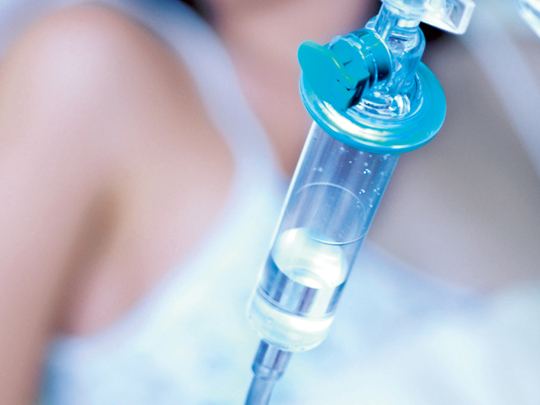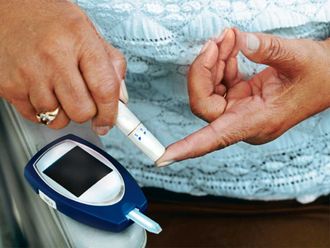
Madonna is a fan. So are Brad Pitt, Simon Cowell and Cara Delevingne. Pop star Rihanna even tweeted a picture of herself getting a blast of energy and nutrients through an IV.
Celebrities and those in the know don’t have time for spas, weeks of detoxing or holidays to rejuvenate. Instead they’re hooking up to a vitamin drip for an instant boost of the essential vitamins straight into their blood stream.
For stars like Cowell it’s as normal as us grabbing a caffeine boost on the way to work. “Even when I’m having a viewing session with producers, [a nurse] just sticks the needle in me and we carry on whatever we are doing,” Cowell told the US edition of GQ.
With the process taking between 15 and 30 minutes, no wonder dozens of Drip and Chill bars are popping up all over showbiz spots like Miami, LA, London and now the UAE.
Kim Pearson, a qualified clinical nutritionist, is aware of the growing popularity of the vitamin drips. “Fans claim to feel an increase in their energy levels as well as concentration and exercise performance,” she says.
“If they aren’t eating optimally, getting enough sleep and generally taking care of themselves, it can be seen as a quick fix to make them feel better. While there are no set statistics on usage of this extreme health and beauty ‘treatment’ these shots should come with a health warning. Vitamin drips have been increasingly marketed in recent years for healthy individuals with no known nutrient deficiencies or health conditions. In these cases they can be unnecessary and even dangerous if not done correctly.”
Like anything injectable, too much or too little could be given, and no-one knows who will suffer potentially fatal side effects like cardiac arrest until it could be too late.
But Dr Samee Majid Matto from the Canadian Specialist Hospital in Dubai, currently the only place to offer vitamin drips in the UAE, insists they are a safe way of boosting general health – specifically when patients are lacking certain vitamins. “We encounter many patients who come to our clinics asking for vitamin injections,” he says. “The most common ones that we administer are vitamin B12 and vitamin D.”
Here in Dubai you have a consultation with a doctor and tests to check for deficiencies, while elsewhere in the world there is a menu of treatments, with vitamins on offer listed like massages and facials. So it’s inevitable that more clinics and hospitals here will soon offer the service.
“We don’t currently offer treatments like the Drip and Chill bars but are aware of the growing trend and demand for them,” says Dr Roberto Viel, plastic surgeon of 15 Harley Street, Dubai Healthcare City. “This is still very new in the UAE and we’re looking to have it on offer in our clinic. We’re researching the protocols and the safety aspect of the treatment before we consider this service. Based in Dubai Healthcare City, we need to work with the authorities to ensure that this treatment can be offered with their approval only.”
So taking into consideration a typical Dubai work hard/play hard lifestyle does Kim think vitamin drips are a good energy or health booster?
“That depends on the individual,” she says. “Some people require IV vitamins for medical reasons – for example, B12 injections are usually administered by doctors in high doses to combat pernicious anaemia, a condition when vitamin B12 cannot be absorbed into your body. In this case they are necessary.
“But many clinics will offer a cocktail of vitamin infusions, comprising a number of different vitamin and mineral combinations – they may promote immune-boosting drips containing nutrients such as vitamin C, zinc and selenium, or energy boosting drips containing nutrients such as B vitamins.”
B12 and Vitamin D are in high demand in the UAE. According to studies, and despite the seriously sunny climate, 78 per cent of the UAE population, both locals and expats, have a vitamin D deficiency. This is most likely due to limited sun exposure. Many of us rush from our cars to the shops or offices in the searing summer heat, and have ongoing concerns about getting burnt in temperatures reaching the high 40s, so there’s a tendency to stay out of the rays. But not getting enough sunshine is a health risk. Vitamin D, which is sourced naturally from the sun, is a fat-soluble vitamin responsible for helping to keep bones strong, boosting the immune system and keeping blood pressure in check. Not enough of it can lead to brittle bones, general weakness and chronic colds, all of which lead to limited energy supplies.
B12 is also required for proper brain and body function. The Canadian Specialist Hospital deals with B12 issues, offering these injections for as little as Dh6.
“This deficiency is more common in vegetarians or those having problems with food absorption/stomach problems,” explains Dr Sarla Kumari, specialist Internal Medicine at the clinic. “Vitamin B12 can be given via a muscle or vein. Before administering the injections, the doctor will give you a test dose to make sure there’s no allergic reaction. If there’s no problems they’ll give you the full dose.”
However, even after proper administration, there could still be issues. “You may get pain or redness at the site of injection, mild diarrhoea, itching or a feeling of mild swelling all over the body,” warns Dr Kumari. “But these side effects are rare.”
The injections aren’t a one-off. “They are usually given either once a week or once a month, depending upon the levels and underlying condition of patient,” she adds.
“And there’s follow–up monitoring of vitamin B12 levels. How many months this is required depends on your condition and levels; your doctor will check your levels to make sure the deficiency has been corrected.”
You’ll pay the expected Dh150 per vitamin D treatment and it takes 5 to 10 minutes to administer. It is very much a medical experience and not the quick and easy lifestyle choice, as depicted by Rihanna’s Twitpic.
In Dubai, the treatment is carried out under strict medical supervision. Elsewhere, however, vitamin injections are offered with the nonchalance of ordering your lunchtime salad. In Las Vegas vans pull up in hotel car parks offering a drop-in drip service and can run as many as 14 IVs at a time to 14 patients at $225 (Dh826) dollars a pop.
Experts like Kim Pearson think there could be a risk of having too many injections just because they’re so readily available in the US and UK.
“There is the potential to reach toxic levels of vitamins and minerals,” she says. “This highlights the need for vitamin drips to be carried out by a qualified and responsible medical practitioner.”
Dr Matto echoes this warning, saying the solution enters the bloodstream so quickly the wrong dosage can be very dangerous. “Like all other medicines, vitamins can cause adverse effects, so should be used only when indicated and advised by a doctor,” he says. “They should never be used for aesthetic purposes.”
Kim is quick to point out that unless you have a specific medical problem such as pernicious anaemia, steer clear. “Regularly taking a good-quality oral vitamin and mineral supplement may provide the same benefits,” she says. “Plus they can be dangerous if not carried out correctly; there is a chance of contracting septicaemia.”
There’s those potential side-effects again. And even if they’re not life-threatening, injections always carry some risk. There can be irritation where the drip is inserted; and bruising and vein damage can be expected. But like any intravenous procedure, there’s a risk of infection and regular use could lead to vein damage. Incorrect dosing could harm the kidneys and liver if they are unable to efficiently dilute the excess minerals, leading to high chloride and sodium levels, which can cause dizziness, weakness and swelling. Very high sodium levels can even cause seizures and coma. In rare cases, the drips could trigger a potentially fatal allergic reaction and cause cardiac arrest.
With this in mind, some doctors even claim they have little or no benefit, saying placebo tests have had the same ‘results’ in not-so-needy patients. The results are still inconclusive and in some camps questionable. So are they a waste of money? “Probably,” adds Kim.
“While many people could benefit from a higher intake of vitamins and minerals, they would do better improving their diet by increasing their vegetable intake.”
But what do these drips feel like and are they worth it? Kate Wills, 29, a writer, tried them as a one off at a London spa after a hectic summer of partying. She opted for a mix of vitamin B, C, magnesium and selenium, to give her energy with the dosage calculated based on her weight and height. “The drip was cold as it went in through a vein in my arm,” says Kate. “And afterwards I felt a bit lightheaded and empty, so I was given tea and biscuits, which also helped with the metallic aftertaste in my mouth.
“At first I didn’t feel any different, but later I think that my vision was brighter and I was definitely feeling less tired. The next day I felt a bit wobbly, but like I’d had a good night’s sleep!”











